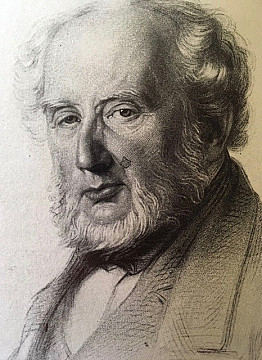Thomas Wilson (1792-1869)
Founder of the Wilson Shipping Line, of Cottingham & Kingston-upon-Hull
He was born into modest circumstances at Hull and was baptised at the Dagger Lane Independent Chapel. Showing an aptitude for numbers, he was apprenticed to a local counting house before getting involved with the steel industry in Sheffield which led him into partnership with John Beckington, of Newcastle. Their company traded in iron ore with Sweden and they sent consignments from their yard at Garrison to Sheffield for smelting. Wilson & Beckington began chartering sail-powered packet ships between Hull & Gothenburg, taking passengers as well as cargo, before incorporating steamships on the Gothenburg and later Norway routes. Their partnership ended in 1840 and bringing in his sons as Thomas Wilson & Sons the business expanded rapidly focusing on the iron ore trade with Sweden. They commissioned their own ships and with their green hulls and red funnels they were nicknamed "Wilson’s parrots".
Both the Wilson and Allan Lines claimed to be the largest privately-owned steamship fleet in the world. When Thomas died in 1869 the Wilson Line owned over a 100-ships, then more than double that of the Allans. Wilson's main trade was to-and-from Scandinavia and the Baltic States, but they also ran routes between the States, the Mediterranean, and India. As much as trade, transporting emigrants was a key cog to their business, and large numbers of Norwegians, Swedes and Jewish refugees from the Tsarist pogroms were brought into Hull, transported overland to Liverpool, and shipped on to America.
Wilson was, "a typical blunt Yorkshireman with a reputation for ruthlessness, however, he was a great philanthropist and contributed generously to many welfare projects in Hull, including the Orphan Homes on Spring Bank and a house for fallen women in Nile Street". Similarly, he and his wife, Susannah, the daughter of a Hull wine merchant, had fifteen children of whom thirteen lived to adulthood (listed above). From the 1840s they lived at Park Cottage in Cottingham, Yorkshire, which eventually became Park House with four servants but was still a comparatively modest home. His business was continued by his sons Charles (created Lord Nunburnholme in 1906) and Arthur, and when he died the funeral cortege from his home to the Hull General Cemetery drew a crowd of 1,500.
Both the Wilson and Allan Lines claimed to be the largest privately-owned steamship fleet in the world. When Thomas died in 1869 the Wilson Line owned over a 100-ships, then more than double that of the Allans. Wilson's main trade was to-and-from Scandinavia and the Baltic States, but they also ran routes between the States, the Mediterranean, and India. As much as trade, transporting emigrants was a key cog to their business, and large numbers of Norwegians, Swedes and Jewish refugees from the Tsarist pogroms were brought into Hull, transported overland to Liverpool, and shipped on to America.
Wilson was, "a typical blunt Yorkshireman with a reputation for ruthlessness, however, he was a great philanthropist and contributed generously to many welfare projects in Hull, including the Orphan Homes on Spring Bank and a house for fallen women in Nile Street". Similarly, he and his wife, Susannah, the daughter of a Hull wine merchant, had fifteen children of whom thirteen lived to adulthood (listed above). From the 1840s they lived at Park Cottage in Cottingham, Yorkshire, which eventually became Park House with four servants but was still a comparatively modest home. His business was continued by his sons Charles (created Lord Nunburnholme in 1906) and Arthur, and when he died the funeral cortege from his home to the Hull General Cemetery drew a crowd of 1,500.
Parents (2)
Children (13)
Associated Books (1)
Categories
Share
Biography principally sourced from a more detailed biography by Bill Longbone on the Cottingham Facebook Site






